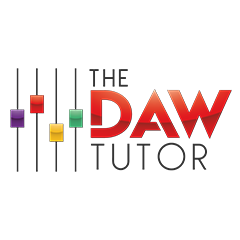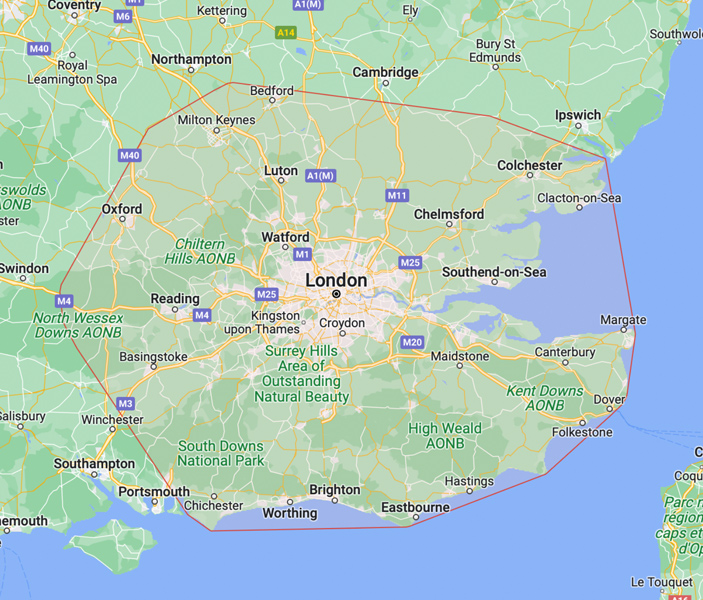Where do lessons take place?
Lessons are held at the location of your choice. Typically, our students choose to learn at home and our tutor visits them for their lessons. If you are learning with The DAW Tutor through your school, lessons will be held on site and your music department will schedule a time slot for you.
We also offer online tuition using Zoom and Skype. These lessons are available worldwide to anyone who speaks English.
Which areas do you cover?
Our tutor will travel anywhere in the Greater London, Essex, Kent, Hertfordshire, Surrey, Buckinghamshire, Berkshire and Sussex regions to teach lessons. The map below gives a general indication of the areas that we cover during normal business hours. We can occasionally provide tuition further afield. Please put in a booking request to see if this is possible.
How much do you charge?
In order to stay competitive, we don’t advertise our prices online, so please get in touch if you would like a quote for any of our services. We charge an affordable hourly rate for lessons and there are no long-term commitments. Discounts are available for advance bookings of 8 hours or more.
Local students are eligible for a discount on any lessons purchased. Please see this post for eligibility.
What does DAW stand for?
Digital Audio Workstation – the type of software used for recording, producing, mixing and editing music and other audio.
What will I learn with you?
You can learn the principles of music production from beginner to advanced level using the DAW software of your choice. With the exception of our Rockschool course, every one-to-one lesson we offer is tailored specifically to your individual requirements. In our first session we will go over the basics and discuss what YOU want to achieve at the end of our time together. Our tutor will then draw up a personalised study pathway for you to work through over the coming weeks and months. We will focus on everything that is necessary to achieving your goals and NOTHING that isn’t.
Can I learn how to produce any style of music?
Absolutely! Our tuition is focused on your desired learning outcome. Whether you want to produce rock, pop, metal, punk, folk, country, classical, house, jazz or something more obscure, we can provide you with the fundamental technical and theory-based skills that you need to develop as a producer.
With that in mind, it is important to understand the difference between a producer and composer/songwriter. While we are happy to advise you on your arrangements, it is worth seeking out some form of instrument tuition if you have no knowledge of music theory. For example, learning piano will be hugely beneficial if you plan on making music entirely ‘in the box’ with software, and taking songwriting lessons will help if you struggle to write lyrics.
Can I gain qualifications by studying with you?
The DAW Tutor offers optional tuition on the full Rockschool syllabus at grades 1 to 8. Once you have completed each level, you can enter yourself for an assessment with Rockschool at one of their regional exam centres.
You can earn an official Steinberg certificate in Cubase by taking one of our Steinberg Certified Cubase Training Courses.
I’m only looking for help with a few things. Do I have to sign up for multiple lessons?
We’re more than happy to accept one-off bookings. Our lessons come with no commitments, unless you want to book multiple lessons up front to benefit from a discount (get in touch to find out more). Of course, we hope that you’ll enjoy the first lesson so much that you’ll be back for more!
Do I need my own recording gear to study?
In order to take lessons with us, you will need a PC or Mac with either Cubase, Logic Pro, Ableton Live, Studio One or GarageBand installed.
If you are looking to purchase additional gear, so that you have a full recording studio setup, we recommend buying a MIDI keyboard, a good pair of over-ear studio headphones, a set of active studio monitor speakers and an audio interface. An audio interface is an external sound card that plugs into your USB port and allows you to connect microphones and instruments to your computer. You might also want to consider buying a condenser microphone if you plan on recording vocals and acoustic instruments.
If you’re unsure about what you’ll need to study with us, please get in touch and we’ll be happy to answer your questions.
Isn’t all the gear really expensive?
Again, no – affordable, entry-level versions of most DAW applications are available and some even come bundled free with audio interfaces and MIDI keyboards.
If you’re on a tight budget, it really has never been easier to get your hands on recording software. GarageBand comes free with every new Apple Mac and there is even a free Lite version of Ableton Live bundled with purchases of Focusrite’s range of Scarlett audio interfaces. You can also get a free copy of Cubase LE if you sign up for Cubase lessons with us.
There are other affordable DAWs available and these are covered in our Budget DAW Lowdown. Please also check out our Essential Home Studio Gear Guide – a handy jargon-free list of all the equipment you’ll need to set up your first home studio, without breaking the bank.
We can also help you choose the best gear for your budget. Please visit our studio installations page for more information. If you sign up for 4 lessons or more, you will be entitled to educational discount on any software or hardware purchase made through our retail partner.
Why don’t you offer Pro Tools or FL Studio lessons?
We took the decision to stop providing Pro Tools tuition in 2020. Avid’s software is plagued with issues and we will not risk hosting it on our computers. Pro Tools has also long fallen behind the competition and we cannot recommend it to anyone considering learning music production.
FL Studio (or Fruity Loops) is not professional music production software. We offer tuition in GarageBand, which is also aimed at amateurs, as that is a good place to start for anyone considering moving on to Logic Pro at a later date. There is no natural progression from FL Studio. We recommend you look at a better option, such as Cubase.

